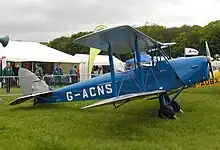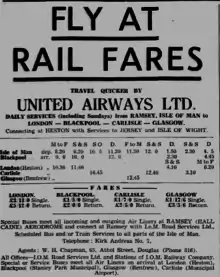| |||||||
| Founded | April 1935 | ||||||
|---|---|---|---|---|---|---|---|
| Commenced operations | April 1935 | ||||||
| Ceased operations | September 1935 merged into Allied British Airways | ||||||
| Operating bases | Stanley Park Aerodrome | ||||||
| Destinations | Isle of Man, Glasgow, London, Carlisle | ||||||
| Parent company | Channel Islands Airways | ||||||
| Headquarters | Blackpool | ||||||
| Key people | Walter Thurgood | ||||||
United Airways Ltd was a British airline operating in 1935, ending as part of British Airways Ltd.
History
Whitehall Securities Corporation was a wealthy investment company run by Clive Pearson, the son of the founder. He was interested in aviation, and invested in Metal Propellers Ltd in 1925, and in Airwork Ltd in 1929. He also invested in Simonds Aircraft in 1928, renaming it Spartan Aircraft Ltd in 1930. Pearson then took a 50% share in Saunders-Roe (SARO) and combined the two companies to produce the Spartan Cruiser airliner. To promote the Cruiser Pearson founded Spartan Air Lines on 2 February 1933, which on 12 April started services from Heston Aerodrome to the Isle of Wight.[1]
Meanwhile, Walter Thurgood was making good profits with Jersey Airways, and was starting another airline, Guernsey Airways. On 1 December 1934, Pearson, along with Great Western Railway and Southern Railway formed a holding company called Channel Islands Airways Ltd to control both airlines, with Whitehall Securities and Thurgood holding two thirds of the shares.[1]


Wanting to expand northwards. Pearson then founded United Airways on 4 April 1935 through Channel Islands Airways, with Thurgood in charge. The fleet was to consist of several Spartan Cruisers from Spartan Air Lines, and newly-ordered de Havilland Dragon Rapides, all of which held six to eight passengers. There were also some pleasure-flying aircraft which would be particularly popular at Blackpool in the coming holiday season.
On 30 April United started services from Spartan’s base at Heston to Blackpool and onwards to the Isle of Man and Carlisle (Kingstown Municipal Airport), with a link by Northern & Scottish Airways (N&SA) from the Isle of Man to Glasgow.[2] In May, Whitehall took a controlling interest in N&SA, and although United included its Western Isles routes as an associate airline, it was never formally part of United. In June 1935 United did take Highland Airways under its wing, but it retained its own identity and a degree of independence.[2]

On 18 June United Airways operated daily services between Blackpool and Leeds, the Isle of Man and Liverpool, and Blackpool and Morecambe. United had taken over the lease of Blackpool's Stanley Park Aerodrome and were running it for the town's Corporation.[3] They were also in talks with the independent Hillman's Airways to run services from London to Amsterdam and Berlin and possibly to Norway.[2]
United Airways lasted less than five months, until 30 September 1935, when under Pearson’s command, Spartan and United along with Hillman's Airways, all combined into one new company, Allied British Airways. That itself only lasted one month, as it was renamed British Airways Ltd on 29 October, and it became a public company on 11 December.[1]
Routes
United Airways routes as in timetable dated 18 June 1935. "In conjunction with Northern & Scottish Airways" and "Connections available with Isle of Wight and Jersey air services".[4]
- Heston — Blackpool — Isle of Man (twice daily)
- Isle of Man — Blackpool — Liverpool (thrice daily)
- Isle of Man — Blackpool — Morecambe (twice daily)
- Blackpool — Leeds (daily)
- Isle of Man — Carlisle (daily, twice on Saturdays)
- Isle of Man — Glasgow (N&SA - daily)
- Glasgow — Campbeltown — Islay (N&SA - daily)
Fleet list
| Type | Registration | From | To | Fate | Notes |
|---|---|---|---|---|---|
| Armstrong Whitworth Argosy II | G-AACJ | July 1935 | 1 October 1935 | Transferred to BAL | The last remaining Argosy, ex Imperial Airways City of Manchester. Used mainly for pleasure flights at Blackpool.[7] Withdrawn from use by December 1936[8] |
| de Havilland DH.60G Gipsy Moth | G-AAYY | 5 July 1935 | 1 October 1935 | Transferred to BAL | Probably used jointly with Spartan AL as instrument trainer. Impressed as MA939[9] |
| de Havilland DH.60GIII Moth Major | G-ACNS | 2 May 1935 | October 1935 | Transferred to BAL | Sold to Airwork Ltd in 1937. Still registered in 2020 |
| de Havilland DH.89 Rapide | G-ADAE | 18 April 1935 | 1 October 1935 | Transferred to BAL | Delivered new to N&SA with United Airways titles, registered to United in May 1935. Sold abroad in 1938 |
| DH.89 Rapide | G-ADBU | 29 April 1935 | 1 October 1935 | Transferred to BAL | Delivered new. Later to N&SA. Withdrawn from use in 1936 |
| DH.89 Rapide | G-ADBX | 4 July 1935 | 1 October 1935 | Transferred to BAL | Delivered new. Crashed at Ronaldsway 6 May 1936 and withdrawn from use |
| Spartan Three-Seater II | G-ABTR | 27 July 1935 | October 1935 | Transferred to BAL | Ex Spartan AL, sold by BAL April 1947, scrapped at Gatwick 1947 |
| Spartan Cruiser II | G-ACDX | 30 April 1935 | October 1935 | Transferred to BAL | Ex Spartan AL. On a BAL ferry flight, written off in forced landing near Gosport 9 October 1935.[10] |
| Spartan Cruiser II | G-ACSM | April 1935 | October 1935 | Transferred to BAL | Ex Spartan AL. Later to N&SA and Scottish Airways, impressed as X9433, scrapped April 1942 |
| Spartan Cruiser II | G-ACYL | April 1935 | October 1935 | Transferred to BAL | Ex Spartan AL. Later to N&SA and Scottish Airways, impressed as X9431, struck off charge November 1941 |
| Spartan Cruiser II | G-ACZM | May 1935 | October 1935 | Transferred to BAL | Ex Spartan AL. Later to N&SA and Scottish Airways, withdrawn from use at Renfrew January 1940, scrapped April 1942 |
Two further Rapides were originally registered to United Airways, G-ADBV and G-ADBW, but never delivered; they were diverted to Jersey Airways.[5]
The fleet livery was plain silver or white with red markings.[2]
Accidents and incidents
There are no recorded accidents or incidents to United Airways aircraft.
See also
References
- 1 2 3 Davies, R. E. G. (2005). British Airways: An airline and its aircraft Volume 1: 1919 - 1939. McLean, Virginia, USA: Paladwr Press. pp. 74–104. ISBN 1-888962-24-0. Retrieved 11 June 2020.
- 1 2 3 4 Moss, Peter (October 1974). "British Airways". Aeroplane Monthly. 2 (10): 934–940.
- ↑ Riding, Richard (December 2016). "Stanley Park Blackpool's Other Airport" (PDF). Airfield Review Web Edition. Airfield Research Group (153): 43–45. Retrieved 15 June 2020.
- ↑ "United Airways timetable June 18, 1935". Airline Timetable Images. Retrieved 17 June 2020.
- 1 2 Fillmore, Malcolm. "De Havilland DH89 File" (PDF). at Air-Britain Researchers Corner. Retrieved 14 July 2020.
- ↑ Fagan, Dave H.; Fillmore, Malcolm (1 May 1913). Simmonds Spartan Aircraft (PDF). Retrieved 16 June 2020.
- ↑ Tapper, Oliver (1988). Armstrong Whitworth Aircraft since 1913 (2nd ed.). London, UK: Putnam. p. 218. ISBN 0-85177-826-7.
- ↑ "Register Entry for G-AACJ" (PDF). G-INFO. UK Civil Aviation Authority. Retrieved 16 June 2020.
- ↑ Fillmore, Malcolm. "De Havilland DH60 File" (PDF). at Air-Britain Researchers Corner. Retrieved 14 July 2020.
- ↑ "ASN Wikibase Occurrence # 202938". Aviation Safety Network. Flight Safety Foundation. Retrieved 16 June 2020.